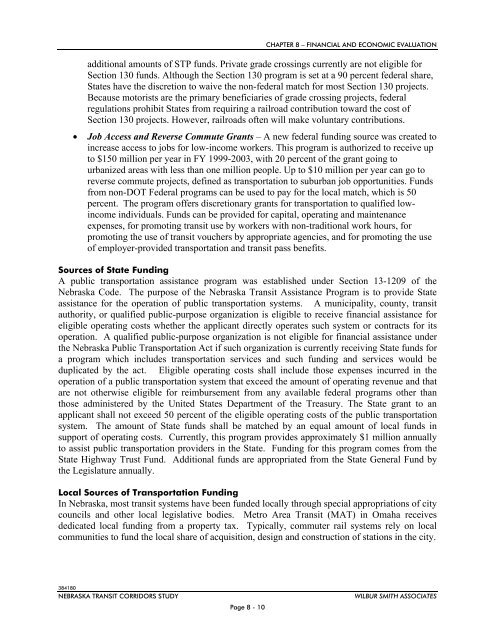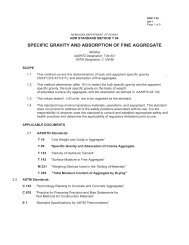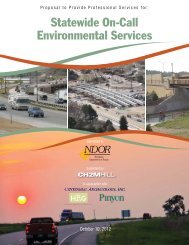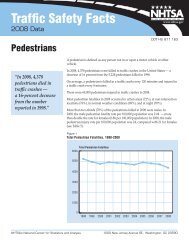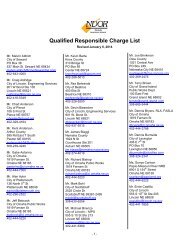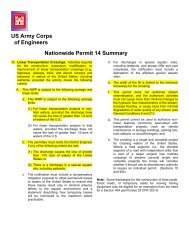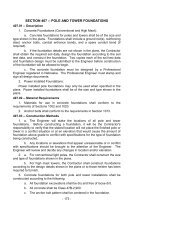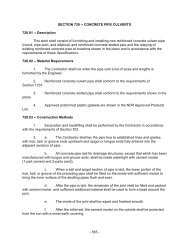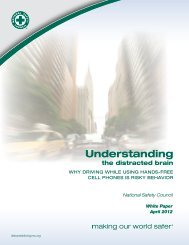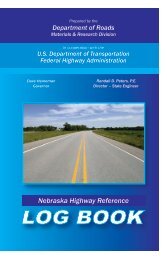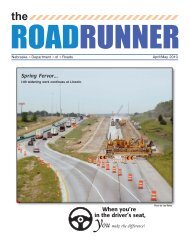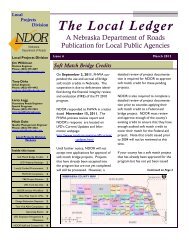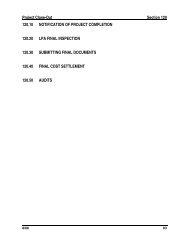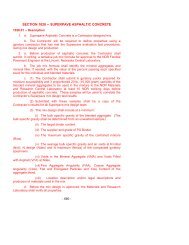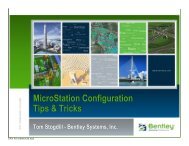NTRAC Final Study - Nebraska Department of Roads - State of ...
NTRAC Final Study - Nebraska Department of Roads - State of ...
NTRAC Final Study - Nebraska Department of Roads - State of ...
You also want an ePaper? Increase the reach of your titles
YUMPU automatically turns print PDFs into web optimized ePapers that Google loves.
CHAPTER 8 – FINANCIAL AND ECONOMIC EVALUATION<br />
<br />
additional amounts <strong>of</strong> STP funds. Private grade crossings currently are not eligible for<br />
Section 130 funds. Although the Section 130 program is set at a 90 percent federal share,<br />
<strong>State</strong>s have the discretion to waive the non-federal match for most Section 130 projects.<br />
Because motorists are the primary beneficiaries <strong>of</strong> grade crossing projects, federal<br />
regulations prohibit <strong>State</strong>s from requiring a railroad contribution toward the cost <strong>of</strong><br />
Section 130 projects. However, railroads <strong>of</strong>ten will make voluntary contributions.<br />
Job Access and Reverse Commute Grants – A new federal funding source was created to<br />
increase access to jobs for low-income workers. This program is authorized to receive up<br />
to $150 million per year in FY 1999-2003, with 20 percent <strong>of</strong> the grant going to<br />
urbanized areas with less than one million people. Up to $10 million per year can go to<br />
reverse commute projects, defined as transportation to suburban job opportunities. Funds<br />
from non-DOT Federal programs can be used to pay for the local match, which is 50<br />
percent. The program <strong>of</strong>fers discretionary grants for transportation to qualified lowincome<br />
individuals. Funds can be provided for capital, operating and maintenance<br />
expenses, for promoting transit use by workers with non-traditional work hours, for<br />
promoting the use <strong>of</strong> transit vouchers by appropriate agencies, and for promoting the use<br />
<strong>of</strong> employer-provided transportation and transit pass benefits.<br />
Sources <strong>of</strong> <strong>State</strong> Funding<br />
A public transportation assistance program was established under Section 13-1209 <strong>of</strong> the<br />
<strong>Nebraska</strong> Code. The purpose <strong>of</strong> the <strong>Nebraska</strong> Transit Assistance Program is to provide <strong>State</strong><br />
assistance for the operation <strong>of</strong> public transportation systems. A municipality, county, transit<br />
authority, or qualified public-purpose organization is eligible to receive financial assistance for<br />
eligible operating costs whether the applicant directly operates such system or contracts for its<br />
operation. A qualified public-purpose organization is not eligible for financial assistance under<br />
the <strong>Nebraska</strong> Public Transportation Act if such organization is currently receiving <strong>State</strong> funds for<br />
a program which includes transportation services and such funding and services would be<br />
duplicated by the act. Eligible operating costs shall include those expenses incurred in the<br />
operation <strong>of</strong> a public transportation system that exceed the amount <strong>of</strong> operating revenue and that<br />
are not otherwise eligible for reimbursement from any available federal programs other than<br />
those administered by the United <strong>State</strong>s <strong>Department</strong> <strong>of</strong> the Treasury. The <strong>State</strong> grant to an<br />
applicant shall not exceed 50 percent <strong>of</strong> the eligible operating costs <strong>of</strong> the public transportation<br />
system. The amount <strong>of</strong> <strong>State</strong> funds shall be matched by an equal amount <strong>of</strong> local funds in<br />
support <strong>of</strong> operating costs. Currently, this program provides approximately $1 million annually<br />
to assist public transportation providers in the <strong>State</strong>. Funding for this program comes from the<br />
<strong>State</strong> Highway Trust Fund. Additional funds are appropriated from the <strong>State</strong> General Fund by<br />
the Legislature annually.<br />
Local Sources <strong>of</strong> Transportation Funding<br />
In <strong>Nebraska</strong>, most transit systems have been funded locally through special appropriations <strong>of</strong> city<br />
councils and other local legislative bodies. Metro Area Transit (MAT) in Omaha receives<br />
dedicated local funding from a property tax. Typically, commuter rail systems rely on local<br />
communities to fund the local share <strong>of</strong> acquisition, design and construction <strong>of</strong> stations in the city.<br />
384180<br />
NEBRASKA TRANSIT CORRIDORS STUDY<br />
Page 8 - 10<br />
WILBUR SMITH ASSOCIATES


